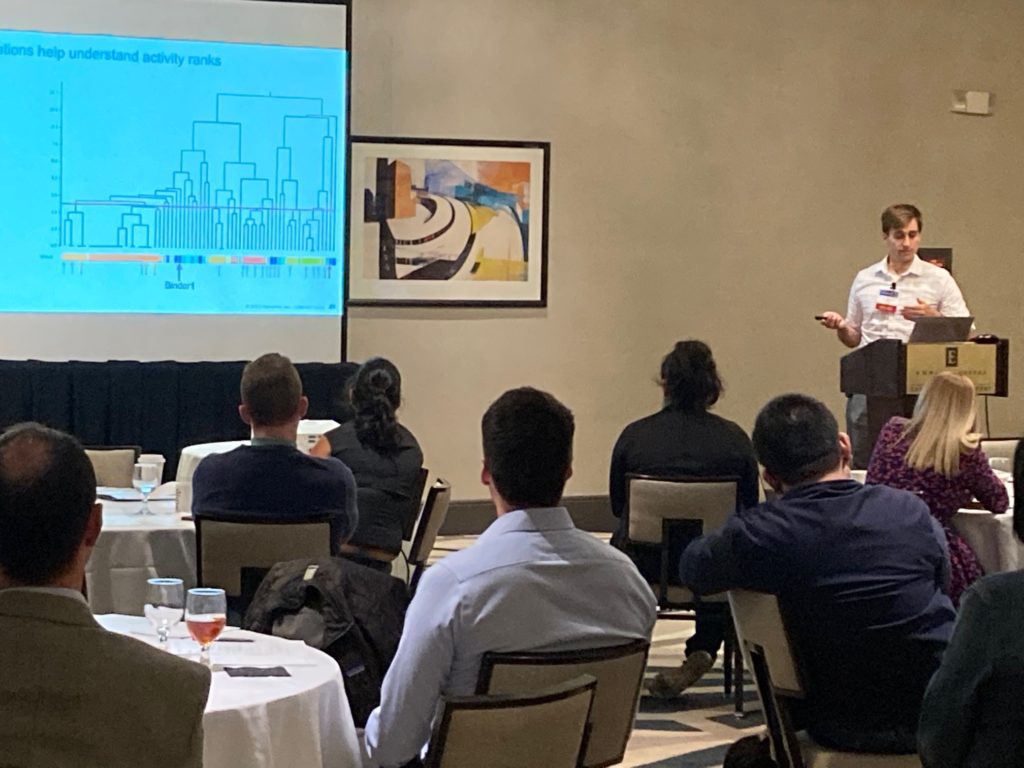Unlocking High-Throughput Biology
Industry and academic scientists presented new paradigms in discovery, applications and workflows including HT-SPR. Topics included:
- Antibody discovery in 90 days! Screening, identification & characterization
- New methods in DELs, PROTACs and other formats
- New technology and innovations during the pandemic
- Data analysis routines & automation
- Best practices in analyzing SPR data
The speakers included scientists from …

You can view the slides from some of the presentations here.
 Kate Hastie, PhD, Instructor, Ollmann Saphire Lab, La Jolla Institute for Immunology
Kate Hastie, PhD, Instructor, Ollmann Saphire Lab, La Jolla Institute for Immunology
Sharon L. Schendel, PhD, Program Manager, La Jolla Institute for Immunology
Keynote Addresses—From Alpha to Omicron: A global consortium study to identify broadly reactive SARS-CoV2 therapeutic antibodies
Abstract: The Coronavirus Immunotherapeutic Consortium (CoVIC) was formed to develop prevention and therapeutic strategies against SARS-CoV-2 that could be mobilized in low- and middle-income countries. With now almost 400 unique antibodies, CoVIC has mapped the epitope landscape on the SARS-CoV-2 Spike protein using the Carterra LSA platform. This information, coupled with high throughput viral neutralization screens and in vivo protection studies, has revealed key communities of receptor-binding domain (RBD)-targeted antibodies that are resistant to major emerging variants. These results provide a framework for selecting antibody treatment cocktails and understanding how viral variants might affect antibody therapeutic efficacy.
 Tom Lopez, PhD, Antibody Discovery and Engineering, Surrozen
Tom Lopez, PhD, Antibody Discovery and Engineering, Surrozen
Antibody Discovery and Engineering at Surrozen
Abstract: Surrozen is a regenerative medicine company focused on Wnt signaling. The Wnt pathway is a master regulator of many biological processes such as injury repair and tissue homeostasis. Surrozen’s technology enables the generation of molecules with drug-like properties for tissue-targeted Wnt pathway modulation. High throughput SPR is central to enabling the design and generation of our novel class of molecules. This presentation will highlight how Surrozen utilizes the Carterra LSA to discover, characterize, and optimize our antibody-based platform.
 Randi Westh Hansen, PhD, Senior Scientist, Antibody Technology, Symphogen a Servier Company
Randi Westh Hansen, PhD, Senior Scientist, Antibody Technology, Symphogen a Servier Company
Characterizing antibody libraries by high throughput Surface Plasmon Resonance – from haystack to lead
Abstract: Using high-throughput Surface Plasmon Resonance (HTP SPR) it is possible to measure hundreds of binding interactions in parallel in a real-time and label-free manner. Binding kinetics, affinities, and cross-reactivity to orthologs or protein family members of large antibody panels combined with epitope binning enable rapid characterization of hundreds of antibody-antigen interactions and epitope coverage. In my presentation, I will show examples of how we use HTP SPR in our workflow of characterizing therapeutic monoclonal antibodies and how HTP SPR combined with a mutagenesis approach was used to identify the epitopes of a two-mAb mixture binding CD40.
 Carterra Application Scientists
Carterra Application Scientists
Best Practices for Designing and Analyzing Epitope Binning Experiments Using the Carterra LSA and Epitope Software
Abstract: We will describe practical guidelines for designing, executing and analyzing epitope binning assays using Carterra’s LSA and industry-leading Epitope™ software. We will provide tips and tricks for leveraging the power of our software to groom a data set, remove unnecessary complexity, and apply community analysis while retaining sufficient nuance to most accurately describe the epitope landscape.
 Carterra Application Scientists
Carterra Application Scientists
New Applications Using HT-SPR Technology
Abstract: From kinetics to epitope characterization, HT-SPR has become an indispensable technology for the characterization of biotherapeutics. This presentation will focus on recently developed assays that expand the versatility of HT-SPR in the biotherapeutic space as well as move into new areas drug discovery. Topics include potency-based assays in addition to approaches focused on characterization of small molecule formats including targeted protein degraders (TPDs) and DNA encoded libraries (DELs).

Mike Brown, Senior Scientist, Adimab LLC
More is Better – High-Throughput and High-Capacity Binding Characterization Assays for Antibody Discovery
Abstract: Binding characterization assays are a critical component of the early discovery process. These assays validate and rank order candidate molecules and can help weed out samples with undesirable properties. When it comes to performing these experiments, more is better – more samples, more reagents, more assays, more throughput, more data. Here we will show how incorporating the Carterra LSA into our discovery platform has allowed us to do more.
 Marina Roell, PhD, Principal Scientist, Alector
Marina Roell, PhD, Principal Scientist, Alector
MerTK Agonism and Antagonism: Patterns Revealed by Domain Binding Studies using High Throughput Parallel SPR Analysis on the Carterra LSA
Abstract: Mer Tyrosine Kinase (MerTK) has been implicated in several diseases and is a potential target for therapeutic antibodies. Different diseases may benefit from either increasing or decreasing MerTK activity. We used Carterra’s LSA and analysis software to evaluate the epitope diversity of a panel of anti-MerTK antibodies by traditional competitive binning and by comparing IgG binding to domain-swapped chimera of MerTK extracellular domain constructs. Differential modulation of biological activity appears to be mediated by antibodies specific to epitopes in different domains of MerTK. These results enabled identification of binding regions for the epitope bins and investigation of the correlation between domain binding and differential activities of anti-MerTK IgGs.

Heather Schwoebel, Chief Business Officer, Alloy Therapeutics
Lucy Liu, PhD, Senior Director and Head of Protein Analytics, Alloy Therapeutics
Fully Integrated Antibody Discovery for the Biotechnology Ecosystem
Abstract: Alloy Therapeutics is a biotechnology ecosystem company that democratizes access to tools, technologies, services, and capabilities that are foundational for discovering and developing therapeutic biologics. Its fully integrated discovery service offering, DeepImmune™, deploys in vivo, in vitro, and in silico discovery and optimization technologies to find partners the best therapeutic antibody candidates. Alloy Chief Business Officer Heather Schwoebel and Head of Protein Analytics Lucy Liu will discuss how the Carterra LSA fits into this workflow and supports its efforts to enable the global scientific community to make better medicine together.
 Denisa Foster, Protein Biochemist, Eli Lilly
Denisa Foster, Protein Biochemist, Eli Lilly
Rapid Epitope Characterization for the Discovery of LY-CoV1404
Abstract: LY-CoV1404 (bebtelovimab) binds the RBD of SARS-CoV-2 in a highly conserved region and was identified to be a potent neutralizer for all of variants of concern. Epitope binning facilitated selection of an antibody that has a different epitope from many of the current clinical antibodies.

Sarah Stuart, PhD, High Throughput Characterisation Team Leader, GSK
More with Less: Optimisation of High-Throughput Screening in the Antibody Discovery Process
Abstract: In recent years there have been many advances in technology that allow techniques previously limited to small numbers of molecules to be applied to large numbers of samples. Applying such techniques in parallel to the early stages of the antibody discovery process enables determination of high throughput kinetics and biophysical screening of hundreds of antibodies. This can facilitate rapid selection of high affinity antibodies with acceptable early stage developability characteristics. A deeper insight into the data can be achieved by applying enhanced analytics capabilities such as artificial intelligence and machine learning. Data can be used for rapid advancement of discovery of new medicines but also in the longer term to track molecular characteristics throughout the discovery process and to predict molecular properties. I will discuss implementation and application of some of the methods and data workflows including use of the Carterra LSA which enable characterisation of more molecules with less material and in less time, and give greater breadth of characterisation, to accelerate decision making while improving opportunities for data reuse.

Derek Croote, PhD, Chief Technical Officer, IgGenix
High-Affinity Monoclonal IgE Antibodies Underlie Tree Nut Co-allergy
Abstract: Tree nut allergies are growing in prevalence and there is a need to understand the molecular bases of clinical phenotypes. IgGenix applied its novel discovery platform to isolate rare IgE antibodies responsible for allergic reactivity from human allergic subjects. These antibodies exhibit high affinity and cross-reactivity to well-characterized tree nut allergens in ways that recapitulate clinical co-allergy.
 M. Frank Erasmus, PhD, Head, Bioinformatics, Specifica, Inc.
M. Frank Erasmus, PhD, Head, Bioinformatics, Specifica, Inc.
Linking NGS to Biophysical Measurements – Important Insights into NGS-Guided Selection Strategies from a SARS-CoV-2 Discovery Campaign
Abstract: Specifica has recently built AbXtract™, a cloud-based bioinformatics platform, in collaboration with OpenEye Scientific to efficiently explore the NGS/Sanger sequence space to select leads with broad paratope coverage. In this webinar, we will showcase how we used our Generation 3 Antibody Library Platform and AbXtract to select antibodies against the SARS-CoV-2 Spike protein and its subunits. Using Carterra’s LSA, we were able to screen >200 antibodies to gather high-quality kinetics and binning data, the majority of which exhibited sub-nanomolar affinities (down to ~13pM), many with distinct binding profiles. Further, we will show how routine biophysical measurements collected from the LSA are incorporated into our informatics platform, providing a robust feedback loop, allowing for marginal improvements of our machine learning models and heuristics that serve to enhance our lead discovery pipeline.
 Oliver Zaccheo, PhD, Senior Group Leader, SPR and Biophysical Assays, UCB
Oliver Zaccheo, PhD, Senior Group Leader, SPR and Biophysical Assays, UCB
Application of Carterra LSA to UCB’s Antibody Discovery Platform
Abstract: Surface Plasmon Resonance (SPR) provides a key screen to identify and characterize high-affinity, species cross-reactive antibodies generated by UCB’s Core antibody discovery platform. We have performed a head-to-head comparison of the Biacore 4000 and Carterra LSA and shown that the LSA is well-suited to the challenge of generating high-quality, high-throughput antibody binding data from individual b-cells. We have now incorporated the LSA to our routine workflows to guide molecule selection based on kinetic binding data and epitope binning.
Tom Lopez PhD from Surrozen presented his findings at the San Francisco Symposium on May 24th.

Lucy Liu PhD from Alloy Therapeutics presented at the Boston Symposium on June 28th.

